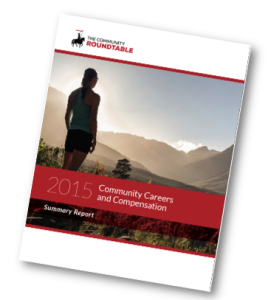 What are the most valuable skills for a community manager? What is the career path? And how much can one make? Those are among the key questions being answered in the Community Careers and Compensation 2015 report, which we released today at The Community Roundtable.
What are the most valuable skills for a community manager? What is the career path? And how much can one make? Those are among the key questions being answered in the Community Careers and Compensation 2015 report, which we released today at The Community Roundtable.
It’s the second year we have done the survey –called the Community Manager Salary Survey in 2014 – and more than just the name changed for this year. We expanded the skills in the Community Skills Framework, introduced questions about where community and community professionals sit in the organization, and looked more closely at the training needs of community professionals.
So what did we find?
Key finding #1: Strategy is everyone’s job.
Community strategy development was the most valued skill of the 50 we asked about in the CCC survey, for each of the three job roles we examined in detail – community manager, community strategist and Director of Community. It was also the highest-value skill among the full survey population.
What it means: Your team sees the value in being a part of the strategic plan. You should, too. Treating strategy as a thing handed down to your managers makes them less effective – and cripples your community management.
Key finding #2: Business, strategic and technical skills are rewarded.
We split up business and strategic skills in this year’s survey, and added – and it shed some new light. Community professionals who placed high value on business, strategic and technical skills made more money than their peers. Strong business and strategic skills were more likely to be found among community strategists and directors – but technical skills were scattered across roles, suggesting a technical specialty is a way to increase earning without taking on managerial responsibilities.
What it means: Three possible growth routes for community managers – up the ladder to Director, out to a wider audience as a Strategist, or deeper into a skillset in any number of specialized roles like community architect, community data specialist or UX expert.
Key finding #3: Community pros are “movers and shakers.”
Community professionals are taking advantage of new opportunities to improve their salary and role. While 60% had four or more years of community experience, nearly ¾ had worked in their current role for three years or less. And more than half of those we surveyed with over five years community experience were able to make more than $100,000 per year.
What it means: Successful community professionals get rewarded for their efforts – and networks play an important role in building bridges to new opportunities.
Key finding #4: Communities are everywhere. Communities can be found throughout organizations to serve a wide variety of goals. One sign of their growing credibility – more than 80% of Directors of Community report to vice presidents or C-suite executives. But communities’ flexibility can be a challenge – because they fit everywhere, they can be marginalized or misunderstood because they don’t fit neatly into a department or org chart.
What it means: Communication is critical – those outside the community ecosystem may have limited or incorrect information about what you do, and there’s no textbook definition of where communities fit.
Salaries are strong – and positive signs for teams.
Salaries for community professionals are again strong – ranging from an average of about $55,000 for community specialists to $70,000 for community managers, $100,000 for community strategists and $113,000 for Directors of Community. Years of experience and the number of direct reports correlated with higher salaries, and external communities tended to pay less.
And there was another striking thing about this year’s sample. Few of them worked alone. Only about 1-in-7 said they were truly “lone wolf” community managers – working as the only person in their organization on community. Community team size averages ranged from four full-timers for internal communities to five for external and seven for communities with both internal and external facets – and overall, 56 percent of those surveyed said there were two or more full-time people in their community team.
These numbers just scratch the surface of the report, which is being released in two forms – as a 20-page summary for the general public, and a full report that looks in depth at the roles and skills of community for TheCR Network members and those who contributed their data to the survey.
To get the summary report – click here!
To get the full report, you can complete the 10-minute survey now at https://the.cr/ccc2015survey. (If you took the survey this year check your inbox for the download link!)
We’ll also be digging into the data in blog posts over the coming weeks. Watch this space for that – and download the report for further exploration.
